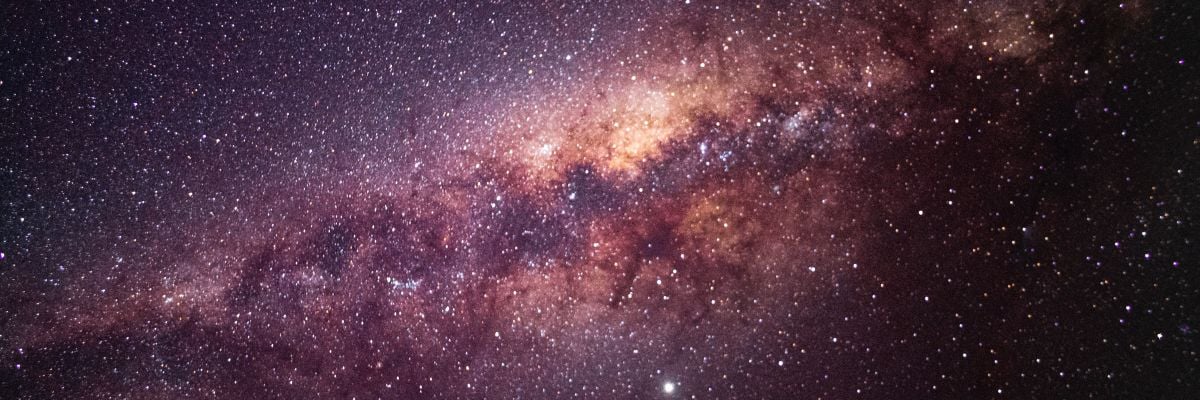
Why would God make a massive universe and then care about one little speck in the middle of it all? Isn’t that a waste of a universe? Jimmy Akin addresses these questions, showing why the vastness of the universe isn’t incompatible with the idea of a loving creator.
Transcript:
Host: Let’s go to Amal now in Canada, watching on YouTube Live. Amal, your question for Jimmy.
Caller: Hi, I just want to first of all thank you for all the work that you do, it’s been really helpful during my journey to Catholicism.
Jimmy: Awesome! Thank you.
Caller: I have a problem with kind of just understanding how the God of the Bible is compatible with the created universe in which we are currently present. Considering the vastness of the universe, the length of time that it has been in existence compared to the time we have been in existence, a kind of infinitesimal number of other stars and planets orbiting them and the random destruction of them throughout the universe, the amount of time it took for us to get on the scene of our planet’s existence, and the time it took for Christ to come through the hundred thousand years of existence of our species.
Jimmy: Okay. Well, I understand the position you’re coming from. These are certainly things that have been mulled over by other people.
I guess I’d proceed along a couple of lines. One of them is: because God is God, and not a man, He’s different than we are. He is not like us. And therefore we shouldn’t expect God to behave or make the same choices that we would make as human beings.
And so for example, you know, if you take a human-centric point of view, you might say “Well, the universe ought to be very young and very small, because humans are the important thing.” But that presupposes a human-centric point of view. God is not human-centric, though; God is infinite, and so He has a much vaster scope than we do, and consequently it wouldn’t be surprising to have an infinite being make a universe of vast size and vast age, because those are also going to reflect aspects of His own vastness.
So partly I think it’s explained by the fact that God is not human-centric, and so we’re a part of His creation, and we glorify Him just by existing because we show some of the ways that God is great—namely, He could create us. But He created other stuff, and that shows other ways that God is great. So partly, I think the answer is: God’s just not human-centric. He’s vaster than that, and by creating a vast cosmos—both vast in space and vast in time—that helps reflect part of the glory of God in creation.
I think there’s also another couple of factors that are relevant. One of them is: humans value efficiency because we have limited resources. I mean, that’s the whole reason that we need to care about managing resources, because we’ve got a limited amount.
You know, we have a certain amount of food, we need to make sure it gets to people who eat it before it goes bad, otherwise it’s wasting food; you know, your parents, I’m sure, always told you “Don’t waste food.” Similarly, we have a limited amount of energy that we can use during the course of the day—personally, I mean, biological, biomechanical energy. So we need to conserve that because we don’t have “unlimited vitality,” no matter what certain nutrient supplement people would tell you.
So we have to manage, you know, what we’re gonna spend our energy on. And this is true across all kinds of different fields. Humans have limited resources that we need to manage wisely. And there’s actually a name for that, because these resources have alternative uses; and there’s a name for the rational management of limited resources that have alternative uses. The name for that is “economics.” That’s what economics is: it’s the intelligent management of limited resources with alternative uses. And we have to be economic about food and our bodily energy and electricity and water and all kinds of different resources, because they’re limited.
Here’s the thing: God does not have limits. He doesn’t have limited resources. He’s omnipotent. And therefore He does not need to be efficient the way we do, because He’s not gonna run out of stuff. He can always make more stuff, and it’s just as easy for God to create a whole new universe as it was to create the first one.
And so rather than thinking about God interacting with the universe as if it’s a kind of machine that he’s built to accomplish something efficiently, it’s more like thinking about God interacting with the universe as if it’s a game that he’s interacting with for the joy of interacting with it.
Host: Oh, what a great analogy!
Jimmy: Yeah. So He’s not trying to, like, accomplish a limited goal with the universe; He’s having joy interacting with His creation, and that’s part of why He doesn’t need to tighten it all down and be super efficient from a human perspective.
But…maybe He is being super efficient, from a divine perspective. Because in order to produce humans—and that is one of His goals, not His only goal with the universe, but it’s certainly one of His goals—in order to produce humans, you need to make certain elements, like carbon and oxygen and hydrogen and phosphorus and the various other elements that are part of our biology. Well, how do you get those?
So God starts the universe in the Big Bang. Our whole universe is in a hot, dense state, and then expansion starts, but wait! As the universe expands, it begins to cool, and three elements fall out of that: hydrogen, helium, and lithium, the three lightest elements, get formed in what’s called “Big Bang nucleosynthesis,” the creation of atoms after the Big Bang.
But that’s it. The Big Bang does not form heavier elements. It doesn’t get up to carbon or oxygen, for example, which you need to have humans. So you need something else to create those. Well, so as the universe expands and cools, stars begin to form. The hydrogen and the helium start to clump up and form stars, which get so heavy that they start burning by nuclear fusion. So they’re so heavy, the hydrogen and helium in them are squeezing together and forming new heavier atoms. But these new heavier atoms are all trapped in the stars, so how do they get out to make humans?
Well, eventually what happens is, the stars run out of their nuclear fuel, they’ve compressed the elements, the hydrogen and helium in them, to the point that they’ve run out of the resources they need to burn with nuclear fusion, and at that point the star isn’t able to resist the forces that are affecting it and it blows up in in a nova. And that releases these elements out into the universe where they can form planets like Earth, and thus allow the development of us as life-forms on Earth using elements like carbon and oxygen and phosphorus and things that are too heavy to have been made in the Big Bang. In fact, a lot of the elements we have on Earth couldn’t be made in an ordinary nova. Ordinary stars can get you up to iron, but beyond iron you need a supernova.
And so like, if you have you have a wedding ring on, Cy, what is your wedding ring made out of?
Host: Stardust.
Jimmy: Well, what metal is it made out of?
Host: I don’t actually know. Silver, maybe.
Jimmy: Silver? Okay, well that would be element 47, or I believe, and that’s heavier than iron, so your what the matter in your wedding ring was made in a supernova.
Host: How appropriate!
Jimmy: And we need these metals in order to have ordinary human life here on earth. So even though you might say, “Well, why does the universe need to be so vast and old?” So it can make the elements that we need to be here.
And so one of the things that God did was set up the universe so that it would operate according to certain laws, and so that it would make stars and the stars would make the elements needed for life and planets, and so Amal had alluded to, you know, stars seeming to explode randomly; actually, it’s not random. We can predict when a star—I mean, approximately—we can predict when a star is gonna go nova. Betelgeuse is on the chopping block right now.
Host: Getting ready to go?
Jimmy: Getting ready to go, because it’s running out of its nuclear fuel.
Host: Don’t say it three times.
Jimmy: Okay! But actually, even though this can look random and not as if it has a purpose from our perspective, it actually does have purposes from God’s perspective. He has the joy of interacting with His creation, which reflects His greatness; He also is using aspects of His creation to bring us about so He can interact with us and show His love for us, and so there is a great purpose behind the size and the age of the universe and the deaths of stars and all those different activities.
Host: Amal, thank you very very much for the question. All that help you?
Caller: Yeah, is it okay if I do a quick follow-up question?
Jimmy: Sure.
Caller: I’m just kind of wondering, I know that God is infinite compared to us finite, and I think we have kind of like a more finite understanding of the universe and how we manage resources and stuff, comparing to God, but couldn’t God just kind of create all those elements, like, right away?
Host: Oh yeah, yeah. Instead of over a long period of time?
Jimmy: Yeah, He could have. He could snap His fingers and create the universe in situ, as it’s said, in the middle of the situation.
And, you know, people have played around with that idea, but here’s the thing again, it goes back to what I said about God not running out of resources: He has no need to do that. Because creating the universe in situ is just as easy for Him as creating the universe and letting it evolve over time. And so He’s not wasting energy, He has unlimited energy, if He chooses to do it this way because it shows His glory and He has the joy of interacting with this for, you know, all this longer history than just a momentary slice of history, then that’s up to God.
And so yes, He could do it another way, He could create us with all these elements ready to go right out of the box, but He doesn’t need to do that. It might seem efficient from a human point of view, but that’s only because we have limited resources we need to manage. God has infinite resources, and so it’s just as valid for God to say “Hey, I’m gonna take time and have this great cosmic saga that leads up to my creation of mankind, and who knows, maybe other races.”
Host: And Amal, I really am happy you asked the question, because it was very pleasant to get to kind of hear the…it’s a great story, I guess we can call it creation. It’s great.
Jimmy: You could call it that, yeah.
Host: It’s a great story, creation!



